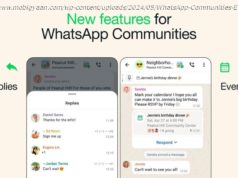A recent convert to the wonders of the web is trying to persuade his neighbors in a remote village that “the whole world rests inside the mobile.”
TARADAND, India — Babulal Singh Neti was sitting with his uncle on a recent afternoon, trying to persuade him of the merits of the internet.
It was 105 degrees outside, and the sun was beating down on the frazzled croplands. His uncle said he had no use for the internet, since he had never learned to read; furthermore, he wanted to nap. This he made clear by periodically screwing up his face into a huge yawn.
Mr. Neti, 38, pressed on earnestly, suggesting that he could demonstrate the internet’s potential by Googling the history of the Gond tribe, to which they both belonged. Since acquiring a smartphone, Mr. Neti couldn’ t stop Googling things: the gods, Hindu and tribal; the relative merits of the Yadav caste and the Gonds; the real story of how the earth was made.
Access to this knowledge so elated him that he decided to give up farming for good, taking a job with a nongovernmental organization whose goals include helping villagers produce and call up online content in their native languages. When he encountered internet skeptics, he tried to impress them by looking up something they really cared about — like Gond history.
His uncle responded with half-closed eyes, delivering a brief but comprehensive oral history of the Gond kings, with the clear implication that his nephew was a bit of a good-for-nothing. “What does it mean, Google?” his uncle said. “Is it a bird?”
And then, theatrically, he yawned.
While India produces some of the world’s best coders and computer engineers, vast multitudes of its people are like Mr. Neti’s neighbors, entering the virtual world with little sense of what lies within it, or how it could be of use to them.
The arrival of the internet in their lives is one of India’s most hopeful narratives.
In the 70 years since independence, India’s government has done very little to connect Taradand, in Madhya Pradesh State, in central India, to the outside world: The first paved road appeared in 2006. There has never been a single telephone landline. Electricity is available to only half the houses. When Mr. Neti was growing up, if someone in the village needed emergency medical care, farmers tied the patient to a wooden cot and carried him five miles through the forest to the nearest hospital, a journey of four hours.
By comparison, India’s battling telecoms have wired Taradand with breathtaking speed. Two years ago, Mr. Neti counted 1,000 mobile phones in the village, which has a population of 2,500. This tracks with India as a whole; last year it surpassed the United States to become the world’s second-largest market for mobile phones behind only China, according to Groupe Speciale Mobile Association, an industry group known as G. S. M. A.
With the cost of both smartphones and data plummeting, it is fair to assume that Taradand’s next technological leap will be onto the internet.
Those who work in development tend to speak of this moment as a civilizational breakthrough, of particular significance in a country aching to educate its children. India’s prime minister, Narendra Modi, has made expanding internet use a central goal, shifting government services onto digital platforms. When Mark Zuckerberg, the founder of Facebook, toured India in 2014, he told audiences that for every 10 people who get online, “one person gets lifted out of poverty and one new job gets created.”
So it is instructive to follow Mr. Neti as he tries to drum up a little interest in Taradand. Young men use the internet here, but only young men, and almost exclusively to circulate Bollywood films. Older people view it as a conduit for pornography and other wastes of time.
Women are not allowed access even to simple mobile phones, for fear they will engage in illicit relationships; the internet is out of the question. Illiterate people — almost everyone over 40 — dismiss the internet as not intended for them.
Still, Mr. Neti persists with the zeal of the newly converted.
“You can call me the black sheep. That’s what I am, ” he said cheerfully. “I don’ t care. It’s the internet age. One day they’ ll all come around.”
Mr. Neti is, in some ways, an unlikely harbinger of technological change. His parents pulled him out of school in fifth grade to marry — his wife was 10 — and though he can read and write in Hindi, his school transcript brands him illiterate, foreclosing any opportunity to get a government job.
When he bought his first mobile phone, in 2001, he was so nervous he did not make a call for nearly a week. When he finally did, he blurted out: “Friend, I have bought this mobile. Is this your number and your name? I am Babulal!” The next day his phone stopped working and he returned to the shop, telling the salesman that something was wrong with the phone.
“I had no idea what to do, ” Mr. Neti said. “He said, ‘Your balance is over.’ ”
But this experience in no way prepared Mr. Neti for his first encounter with the smartphone, which he spotted about a decade ago in the hand of a computer operator in Taradand’s local administration building.
The official was an agreeable sort, and Mr. Neti began borrowing his phone for two- and three-hour stretches. He went on Google, searching for the word “Gondwana, ” the name for the Gond tribe’s traditional land.
“It was as if I had opened up history, the history of Gondwana, ” he said. “It seemed fascinating. You didn’ t have to buy a book. The earth map came up as round, and part of it was Gondwana. Ireland, Gondwanaland, Switzerland. I was fascinated. No sooner would I see a mobile than I would run over.”
Only after some time, he recalled, did Mr. Neti realize it was possible to search for terms other than Gondwana.
“It seemed, ” he said, “as if I was diving into a sea with no bottom to it.”
This marked the beginning for Mr. Neti of a wide-ranging inquiry about the world surrounding him. He was interested, for example, in knowing whether the residents of other countries worshiped Ram, the Hindu deity and, upon discovering that they did not, hastened to inform his neighbors of this startling news. He decided to fact-check the assertion of a childhood friend, who is from the Yadav caste, that the Yadavs had been present at the creation of the earth and learned this was not a universally accepted view.
“I told him I wasn’ t personally saying anything about the Yadavs, it was Google saying something negative, ” Mr. Neti said. “He was very offended.”
At some point, Mr. Neti discovered that he had become skeptical of nearly everything he had been taught. “I tried to find out if the gods created the earth, ” he said. “I found out it was not true. But still I cannot answer the question of who created the earth. But I believe Google contains the answer.”
Mr. Neti finds it maddening that, in a region whose farmers are desperate to educate their children, his neighbors still regard the internet principally as a way to watch movies.
“The villagers do not yet understand, ” he said “They don’ t know that the whole world rests inside the mobile. The day people realize that, they will stop going out to study.”
If Mr. Neti’s audience was tougher than usual, there was a reason: A 15-year-old girl from Taradand had just eloped with a 17-year-old boy from a different caste, and everyone was blaming technology. There was no evidence the young couple planned their getaway on the phone, but everyone assumed it.
“Ninety-nine percent of mobile users misuse them, ” said Devender Kumar Patel, 17, whose hair had been coaxed into a four-inch ducktail. “Rapes are an outcome of these things. One of my cousins received a call on a mobile phone, was asked to go someplace and was murdered.






